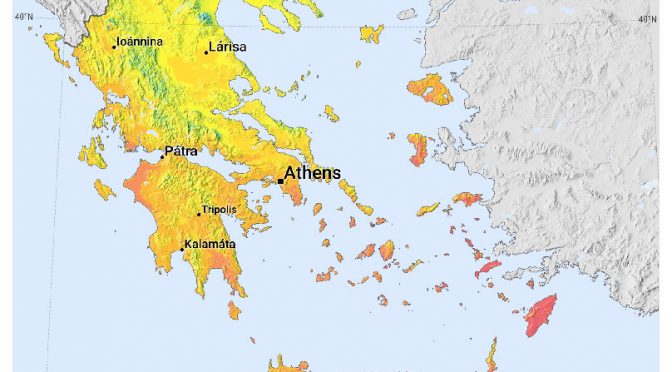Greece has enacted an impressive array of measures to support its ambitious climate goals while maintaining energy security. However, stronger actions are required to bring down its dependence on fossil fuels and reach its target of net zero emissions by 2050, according to a new report by the International Energy Agency.
The report praises Greece for its significant progress since 2017, when it last underwent an IEA review. Greece has set new targets for reducing greenhouse gas emissions, cut its use of coal-fired generation sharply, reformed its electricity and natural gas markets, expanded its cross-border interconnections, and passed legislation to enable the development of offshore wind generation. It has managed to lower its share of fossil fuels in its energy supply – from 91% in 2011 to 82% in 2021 – but it still remains above the IEA average of 78%.
The National Climate Law, adopted in May 2022, sets a clear direction for Greece’s energy transition. It aims to cut greenhouse gas emissions by 55% by 2030 and achieve net zero emissions by 2050. Greece has already achieved a very significant reduction in the share of electricity generation based on lignite, or brown coal, from 60% in 2005 to 10% in 2021. The Climate Law requires to a complete phase-out of lignite-fired generation by 2028.
“Greece has taken important steps in cutting its use of coal and harnessing its wind and solar resources,” said IEA Executive Director Fatih Birol. “It must now build on this success by going further and faster, including by speeding up the permitting process for new renewable energy projects. At the same time, it needs to ensure that planned new investments in gas infrastructure reflect what is needed to maintain security of supply and that the risks of creating stranded assets are fully evaluated.”
Greece’s energy policy seeks to boost renewable power generation while increasing the share of overall energy demand covered by electricity. By 2030, Greece plans to have 2 gigawatts of offshore wind power, which is equivalent to 10% of its current electricity capacity. Greece is also a world leader in rooftop solar thermal systems, which provides hot water for buildings using the abundant sunshine.
Greece is not only enhancing its domestic energy production, but also expanding its regional and international connections. The country is building new electricity interconnections to export its surplus renewable energy and diversify its sources of supply. Greece has also taken action to modernise its electricity and gas markets, including reforms to support full integration into the European common electricity market. The country has also sharply cut its dependence on Russian fossil fuel imports since its invasion of Ukraine, boosting its LNG import capacity and diversifying gas supplies. Greece is now able to meet almost all its gas demand from LNG sources, enhancing its energy security and flexibility.
With a building stock and vehicle fleet that are older than both the EU and IEA average, Greece has notable opportunities to improve its energy efficiency. Greece is taking some important steps, including the phase out of oil boilers by 2025 and replacing them with heat pumps and other clean alternatives. It is also introducing biofuel blending mandates to support the decarbonisation of road transport. But additional efforts are needed to strengthen building codes, upgrade heating and cooling systems, promote the replacement of older vehicles, encourage the adoption of electric vehicles, and eliminate its remaining fossil fuel subsidies.
Greece has made positive progress in reducing its use of coal and reforming its energy markets, but more should be done to deploy renewables and promote efficiency
Greece 2023
Read the report
Greece aims to reduce total greenhouse gas emissions by 55% by 2030 and reach net zero emissions by 2050. It has made notable progress towards meeting these targets. Following Russia’s invasion of Ukraine, Greece is reducing its reliance on Russian energy imports and ensuring secure access to energy by diversifying its supply and increasing domestic energy production. Despite these notable successes, significant challenges remain. In this report, the IEA provides a range of energy policy recommendations to help Greece smoothly manage its transition to a secure, efficient and flexible carbon neutral energy system. Explore report


